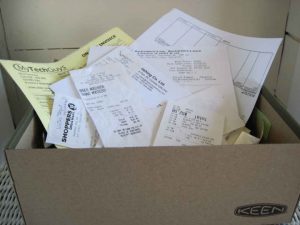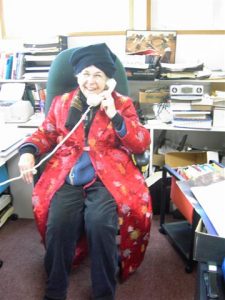I have the fondest memory of my Dad holing up in the basement, from which a cloud of blue smoke and colourful profanities wafted up for several days. It was income tax time and Dad went head to head with the Prime Minister of the day, determined not to pay “that bloody .…..” or “that smarmy .…” a cent more than absolutely necessary to keep the Canadian safety net shipshape.

Since 1981, I’ve filed my income taxes as a writer, thanks to hopping off the career ladder and lugging home 1,500 rice paper fables that I made in Kathmandu, Nepal. Writers are allowed three to five years to produce a novel and to earn zero income while racking up research and travel expenses.
I am proud to say I managed to earn more than zero from selling my writing every single year since 1981 but some years, especially those fifteen years when we ran a bookstore and when I worked as a publishers’ rep, it was a minor miracle for me to write a grocery list let alone a haiku or to sell a single bon mot.
But if we writers don’t take our work seriously, then we will be hobbyists forever more and the fact is, a great many of us donate hundreds of hours and dollars to our communities and the causes of the world annually.
You can be very sure that the Prime Minister’s minions will seek you out and pick your pockets when your next book is a bestseller and that they don’t much care if you took an eighteen year apprenticeship at very low ‘wages’ to become an overnight success.
I’ve used the same one-page format to report my writing expenses and income since 1981. I ignore the reams of forms provided for professional and small business people and so far, the Prime Minister has merely sighed and accepted my puny efforts.
Here it is:
2010 Writing Income & Expenses
Caroline Hendrika Woodward
Social Insurance Number
Expenses
Advertising/Promotion…………………….$x
(website, author photos, schmoozing costs at ½ the meal or pub bill. Sadly, not for new shoes to wear when launching your latest book)
Automobile Expenses………………………$y
(getting yourself to reading tours, workshops, etc. Fuel, repairs, insurance, parking. Keep a mileage log & yes, claim every trip to and from the Post Office)
Office Expenses-ph/fax/internet………… $z
(straightforward)
Other Office Expenses & Materials…… $x
(magazine subscriptions, stationery, books, a decent chair, bookshelves, computer)
Light/Heat/Water…………………………… $y
(if you live in a 5 room house with a one room office, claim 1⁄5 your annual costs)
Travel, excluding auto………………………$z
(bus, plane, hotel & meals for writing gigs not covered by publisher or hosts)
Office Rent…………………………………… $x
(if you rent a separate office, otherwise, claim 1⁄5 (or whatever) of your household rent or mortgage payments)
Capital Cost Allowance………………………$y
(see guide, I used this once in the 80’s to depreciate the cost of a new computer but am no longer a reliable guide to this category)
TOTAL…$xyz
2010 Writing Income……………………………$not nearly enough
Net Loss………………………………………… (-$ sigh, net loss again-bonus, it can be applied to reduce your respectable income as a bricklayer, lightkeeper, ranch hand or writing teacher)
ALL RECEIPTS HELD.
_________________________ _________________
Caroline H. Woodward Date
During this humbling process, I offer up thanks to the determined writers who lobbied for the Public Lending Right so that library usage of our books is compensated for, ditto for the Canadian Access Copyright group who pay us for our work being used in schools and universities and elsewhere.
In memory of Dad, I curse Stephen Harper with gusto and with good reason. And every year, I look long and hard at the description of the Vow of Perpetual Poverty. There but for the wimple, go I.
Two things: keep every receipt in tidy envelopes for seven years and be scrupulously honest (the karma thing). Also, try filing online. I just got my 2010 return deposited in my Credit Union in seven business days flat. Hurrah for newfangled thingeybobs!

